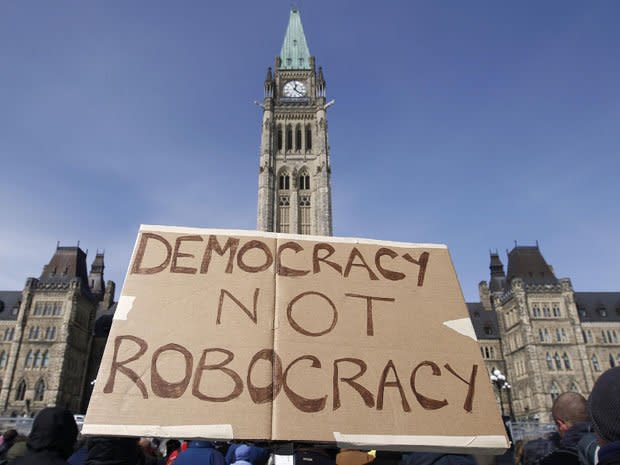 Canada Politics
Canada PoliticsReport suggests link between Saskatchewan robocalls and ‘Pierre Poutine’ robocalls
If anybody's wondering why Canadians are so cynical about our politicians, you have to look no further than the latest robocall 'scandal.'
Last Friday, the Tories denied any involvement in a 'push-poll' to a number of Saskatchewan residents chiding the province's new federal riding boundaries. The call -- according to PostMedia News — failed to identify on whose behalf the call was made as required by CRTC rules.
[ Related: Conservative campaign manager at heart of robocall scandal packs up for Kuwait ]
On Tuesday — apparently after a weekend of prodding by some intrepid reporters — Conservative party spokesperson Fred Delorey released this statement admitting that they were behind the calls.
"In regards to the calls last week that went into Saskatchewan concerning redistribution, the calls came from the Conservative Party.
There was an internal miscommunication on the matter, and the calls should have been identified as coming from the Conservative Party.
As I said in the past, we are not polling on this issue, we already know where people stand - 75% of people who attended the public hearings and submitted written submissions opposed these drastic changes to the boundaries.
But we are doing a host of things to communicate with voters and get their feedback.
Not only were these changes opposed by 75% of the public, but an actual member of the commission also opposed these changes, which led to an unprecedented Dissenting Report by the boundary commission."
There are two questions that Canadians deserve answers to: Why did they did they initially deny making the calls, and what's their 'end-game' here? Are they trying to get the independent non-partisan electoral boundary commission's decision reversed?
Moreover, why didn't they identify themselves? They certainly made a big stink about it last year when the Liberals were penalized for not identifying themselves in an election campaign robo-call.
"How many other Liberal campaigns broke Canadian telecommunication rules?" Delorey wrote in one of seven Tweets gleefully blasting the Grits. "How many used robocalls to mislead Canadian voters?"
[ More Politics: Has the Idle No More movement fizzled out? ]
PostMedia News has also learned that Matt Meier, the principle of Racknine — the company hired for the 'Pierre Poutine' robocall scandal — is also involved with Chase Research, the firm involved with the Saskatchewan calls.
"[Ed Primeau, a] Forensic voice-analysis expert has matched a voice recording from a mysterious company that sent out a robocall “push poll” about Saskatchewan riding boundaries to the firm that was used to send out the infamous “Pierre Poutine” calls in the last election.
Primeau, who has testified as an expert witness in dozens of cases in American courts and overseas, is a board member of the American Board of Recorded Evidence and a member of the American College for Forensic Examiners International.
He said he is 95-per-cent certain that [Matt] Meier recorded the outgoing messages used by the mysterious Chase Research."
On Wednesday, NDP MP Thomas Mulcair and the NDP attacked the Tories on this issue.
Here's some of the back and fourth between the two leaders:
Thomas Mulcair: The independence of the Canadian electoral boundary commission is fundamental to our democracy. Conservatives paid for fraudulent robocalls using a fake company name to misinform voters and manipulate an important part of our democratic system.
Worst yet, Conservative party officials lied to Canadians to try to avoid taking responsibility for their actions. Who will the prinme minister hold accountable for this fraud?
Stephen Harper: Clearly I rejected the accusations of that particular question. I think the party has explained this particular matter. As I think the Speaker knows very well, there are electoral commissions in effect to redraw boundaries. Those commissions accept and expect input from Parliamentarians, from political parties and from the general public. There has been, in Saskatchewan, overwhelming opposition to the particular proposals but we are simply operating within the process as it exists and indeed it encourages all actors to do.
Thomas Mulcair: How do robocalls become input in our democratic process?
(Photo courtesy of Reuters)
Are you a politics junkie?
Follow @politicalpoints on Twitter!



